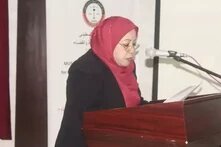Eleven outstanding feminists from around the world, who where selected as 2025 Feminist Foreign and Development Policy Fellows, participated in the 69th Commission on the Status of Women at the UN Headquarters. Here they share their main considerations.

The 2025 Feminist Foreign and Development Policy Fellows, who participated in the 69th Commission on the Status of Women, held at the United Nations Headquarters in New York City from March 10 to 21, centered their engagement on commemorating the 30th anniversary of the Beijing Declaration and Action Platform. They highlighted the profound impact of the Beijing Agenda and its implementation on the lives of women and girls worldwide.
As fellows of the 2025 Feminist Foreign Policy Fellowship, we got to be present for the first week of the CSW from March 9 to 14. During this period, we engaged in productive meetings with partners of the Heinrich-Böll-Stiftung (HBF), representatives of the German Government and the German Embassy. Additionally, we attended events organized by UN agencies, side events hosted by governments, and sessions led by civil society organizations. These interactions provided valuable opportunities to raise our concerns about the progress and challenges faced by member states and international organizations in addressing critical human rights issues. Our discussions underscored the need for meaningful collaboration and accountability to advance feminist foreign policy and strengthen human rights protections worldwide.
Consequently, we consider it important to share our main considerations after attending the 69th CSW:
- Visible attacks on democracy and the advance of the far-right movements. The CSW events were linked transversally by conversations about the advancement of anti-democratic, far-right movements in national and international scenarios and the defunding of international and civil society organizations worldwide. Sadly, there were not enough public and large-scale conversations about the strategies to fight these movements and protect a Women and girl’s human rights agenda on an international and national level from an intersectional lens.
- Lack of conversations related to ongoing armed conflicts. As a group, we expected more information and conversations related to the actions being carried out by the UN system concerning ongoing armed conflicts such as Palestine, Congo, Sudan, Afghanistan, Ukraine, and the Kurdish conflict, and the consequences such conflicts have on the lives of women and children.
- The importance of local activists and their experience. Local activists and human rights defenders brought to the CSW their experience, strategies, and strengths, which contributed to creating passionate, informed, and creative conversations about effective strategies to fight for the implementation of the Beijing Agenda and Action Platform, to improve Women and girls’ lives, and to guarantee human rights across intersections keeping the gender diversity in mind, especially in the Global South.
- Political Declaration of the 69th CSW: We celebrate the expedition of a unanimous Political Declaration by the Member States at the CSW, especially as this declaration calls upon the United Nations system to continue to support the full, effective and accelerated implementation of the Beijing Declaration and Platform for Action and welcomes the contributions made by civil society However, we highlight that the elimination of the mention of sexual and reproductive rights of women, girls and gender minorities is a grave omission of a key aspect of the Beijing Agenda and gender equality.
A Call to Action
We urge the United Nations, Member States, and Civil Society to ensure the full and effective implementation of the Beijing Declaration and Action Platform, with a truly intersectional approach that takes into account disability, sexual and reproductive rights, racism, and colonization, and also strives towards effective actions and strategies that have a direct impact on the life of women, children and gender minorities worldwide.

